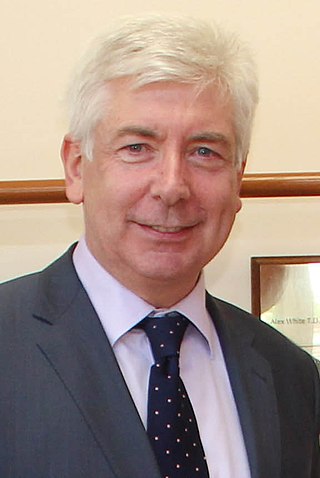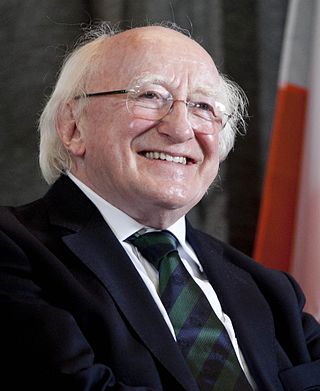
The president of Ireland is the head of state of Ireland and the supreme commander of the Irish Defence Forces.

Mary Patricia McAleese is an Irish activist lawyer, academic, author, and former politician who served as the eighth president of Ireland from November 1997 to November 2011. McAleese was first elected as president in 1997, having received the nomination of Fianna Fáil. She succeeded Mary Robinson, making her the second female president of Ireland, and the first woman in the world to succeed another woman as president. She nominated herself for re-election in 2004 and was returned unopposed for a second term. Born in Ardoyne, north Belfast, McAleese is the first president of Ireland to have come from either Northern Ireland or Ulster.

Dana Rosemary Scallon, known professionally as Dana, is an Irish singer and songwriter.

The 1945 Irish presidential election was held on Thursday, 14 June 1945. It was Ireland's first contested presidential election. Outgoing president Douglas Hyde, who had served since 1938, decided not to seek a second term. Fianna Fáil nominated its deputy leader, Tánaiste Seán T. O'Kelly, as its candidate. Fine Gael nominated Seán Mac Eoin. Independent republican Patrick McCartan sought and failed to receive the necessary four nominations from local councils, but secured a nomination from Oireachtas members.

The 1990 Irish presidential election was the tenth presidential election to be held in Ireland, the fifth to be contested by more than one candidate, and the first to have a female candidate and winner. It was held on Wednesday, 7 November 1990 and was won by Mary Robinson on a joint Labour Party and Workers' Party ticket. The election was the first time in history a Fianna Fáil candidate failed to win the presidency. It was also the first time the Labour Party had contested a presidential election. The election had one of the tightest margins of victory in Irish presidential elections history, and the final leg of the campaign was characterised by intense internal turmoil within the Fianna Fáil party as well as personal attacks on the candidates from competing political parties. The election was considered a political failure for the Fine Gael party and would cause their leader, Alan Dukes, to resign in the immediate aftermath.

The 1997 Irish presidential election was held on Thursday, 30 October 1997. It was the eleventh presidential election to be held in Ireland, and only the sixth to be contested by more than one candidate. It was held ahead of schedule when incumbent Mary Robinson resigned to assume her new appointment as the United Nations High Commissioner for Human Rights.

The 2002 Irish general election to the 29th Dáil was held on Friday, 17 May, just over three weeks after the dissolution of the 28th Dáil on Thursday, 25 April by President Mary McAleese, at the request of the Taoiseach, Bertie Ahern. The general election took place in 42 Dáil constituencies throughout Ireland for 166 seats in Dáil Éireann, the house of representatives of the Oireachtas, with a revision of constituencies since the last election under the Electoral (Amendment) Act 1998.

Michael Daniel Higgins is an Irish politician, poet, broadcaster and sociologist who has served as the ninth president of Ireland since 2011. Entering national politics through the Labour Party, he served as a senator from 1973 to 1977 having been nominated by the Taoiseach. Elected in 1981 as a Teachta Dála (TD), he represented the Galway West constituency from 1981 to 1982 and 1987 to 2011. Between these terms, he returned to Seanad Éireann from 1983 to 1987 as a senator for the National University. He served as minister for arts, culture and the Gaeltacht from 1993 to 1997 and mayor of Galway from 1981 to 1982 and 1990 to 1991. Higgins was the president of the Labour Party from 2003 to 2011, until he resigned following his election as president of Ireland.
Gemma Hussey is an Irish former Fine Gael politician who served as Minister for Social Welfare from 1986 to 1987, Minister for Labour from January 1987 to March 1987, Minister for Education from 1982 to 1986, Leader of the Seanad and Leader of Fine Gael in the Seanad from 1981 to 1982. She served as a Teachta Dála (TD) for the Wicklow constituency from 1982 to 1989. She also served as a Senator for the National University from 1977 to 1982.

The 2007 Irish general election took place on Thursday, 24 May after the dissolution of the 29th Dáil by the President on 30 April, at the request of the Taoiseach. The general election took place in 43 parliamentary constituencies throughout Ireland for 166 seats in Dáil Éireann, the lower house of parliament, with a revision of constituencies since the last election under the Electoral (Amendment) Act 2005.
Fergus Finlay is the former Chief Executive of the charity Barnardos in Ireland, leaving the post in 2018. He was a senior member of the Irish Labour Party and is also a weekly columnist with the Irish Examiner and the author of a number of books.

The 2011 Irish general election took place on Friday 25 February to elect 166 Teachtaí Dála across 43 constituencies to Dáil Éireann, the lower house of Ireland's parliament, the Oireachtas. The Dáil was dissolved and the general election called by President Mary McAleese on 1 February, at the request of Taoiseach Brian Cowen. The 31st Dáil met on 9 March 2011 to nominate a Taoiseach and approve the new ministers of the 29th government of Ireland.

Alex White is an Irish lawyer and a former Labour Party politician. Since January 2023 he has been Director General of the Institute of International and European Affairs, a think-tank based in Dublin. White served as Minister for Communications, Energy and Natural Resources from 2014 to 2016, Minister of State for Primary Care from 2012 to 2014 and Leader of the Labour Party in the Seanad 2007 to 2011. He served as a Teachta Dála (TD) for the Dublin South constituency from 2011 to 2016. He was a Senator for the Cultural and Educational Panel from 2007 to 2011.

The 2011 Irish presidential election was the thirteenth presidential election to be held in Ireland, and was contested by a record seven candidates. It was held on Thursday, 27 October 2011. The election was held to elect a successor to Mary McAleese, with the winner to be inaugurated as the ninth President of Ireland on 11 November 2011. Two constitutional referendums and a by-election for a vacant Dáil seat in the Dublin West constituency took place on the same day.

The 2016 Irish general election to the 32nd Dáil was held on Friday 26 February, following the dissolution of the 31st Dáil by President Michael D. Higgins on 3 February, at the request of Taoiseach Enda Kenny. The general election took place in 40 Dáil constituencies throughout Ireland to elect to elect 158 Teachtaí Dála to Dáil Éireann, the house of representatives of the Oireachtas. There was a reduction of eight seats under the Electoral (Amendment) Act 2013.

The 2018 Irish presidential election took place on Friday, 26 October, between 7.00 a.m. and 10.00 p.m. President Michael D. Higgins, who was elected in 2011 with the support of the Labour Party, was seeking re-election to a second term as an Independent. This was the first time since the 1966 election that an incumbent president faced a contest for a second term. Higgins was re-elected on the first count with nearly 56% of the vote, becoming the first president since Éamon de Valera to win a second term in a contested election. He was inaugurated for his second term on 11 November.
Mary Moran is an Irish former Labour Party politician who served as a Senator from 2011 to 2016, after being nominated by the Taoiseach.
Independent politicians contest elections without the support of a political party. They have played a continuous role in the politics of the Republic of Ireland since its independence in 1922.

Mary McAleese began her first term as President of Ireland on 11 November 1997, following her inauguration at Saint Patrick's Hall in the State Apartments in Dublin Castle. McAleese was first elected as president in 1997, having received the nomination of Fianna Fáil. She succeeded Mary Robinson, making her the second female president of Ireland, and the first woman in the world to succeed another woman as an elected head of state.












